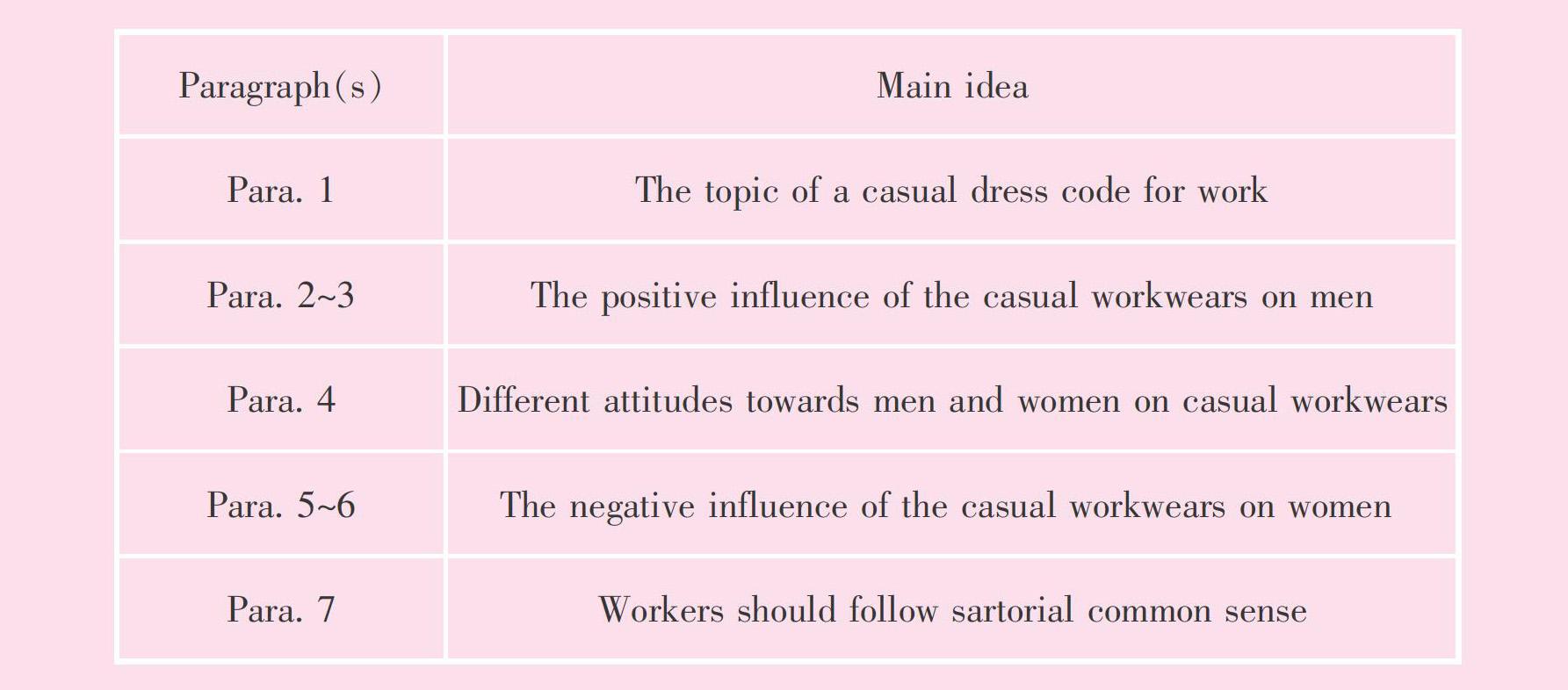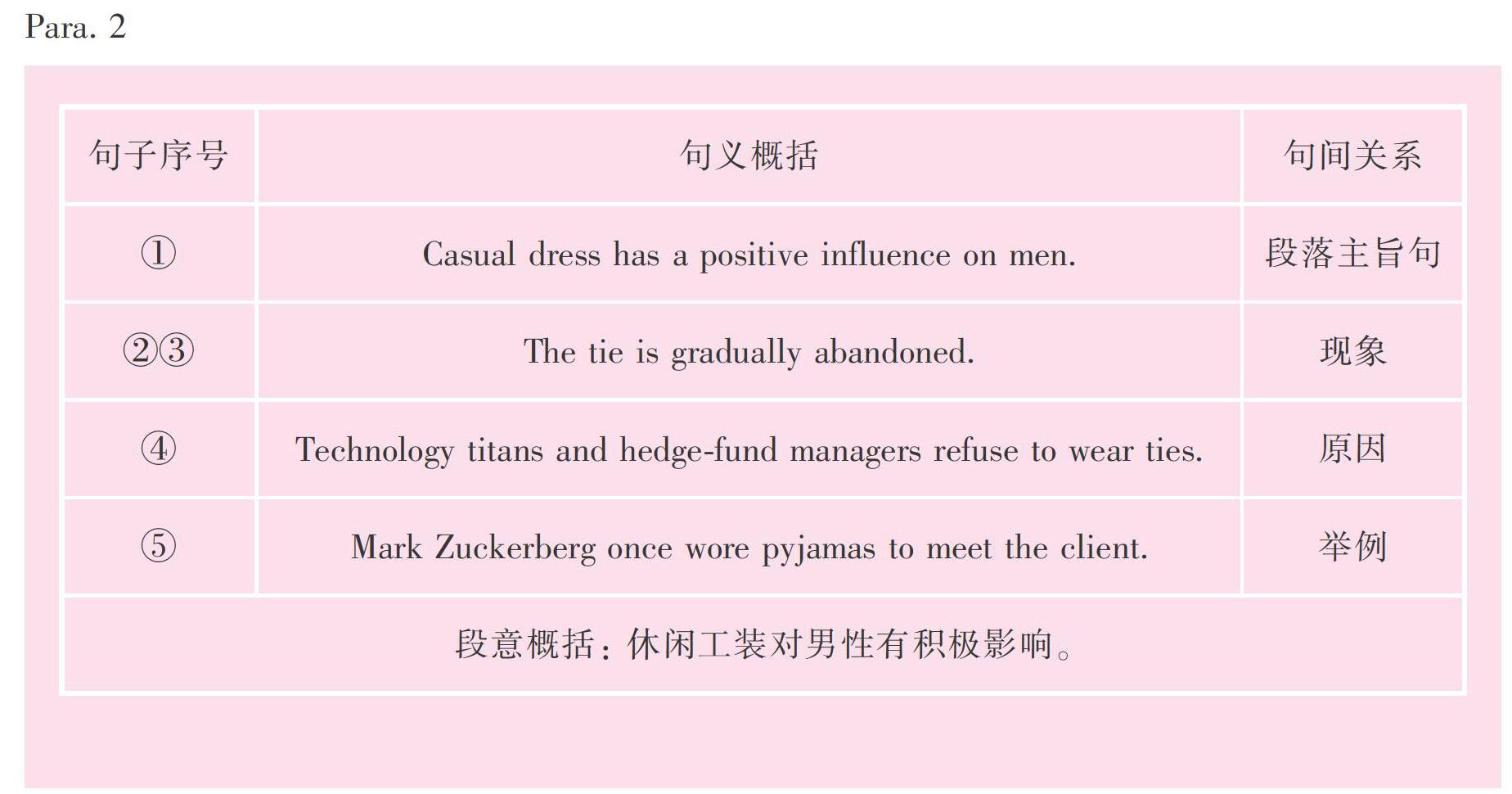休闲装还是正式装?
李璐



难词探意
1. hemisphere n. 半球
2. demise n. 消亡;终止
3. titan n. 巨人;巨头
4. garish adj. 花哨的;耀眼的
5. outfit n. 全套服装
6. snarky adj. 讽刺挖苦的
7. scruffy adj. 邋遢的;脏乱的
8. metabolic adj. 新陈代谢的
9. empowerment n. 授权
10. femininity n. 女子气质
11. prudish adj. 迂腐守旧的
12. sartorial adj. 衣着的;服装的
原文复现
Summers approaching in the northern hemisphere brings with it a dilemma that plagues every office worker. What does a casual dress code mean in practice? The happy medium between looking like Kim Kardashian and Hagrid the giant is hard to pin down. Goldman Sachs has just implemented a “flexible dress code” although the executive memo noted that “casual dress is not appropriate every day”.
①For men, the move to casual dress seems entirely positive. ②Few people will mourn the demise of the tie, a functionally useless garment that constricted male necks for a century. ③The tie became standard office wear from the 1920s. ④In the 1990s ties started to go out of fashion because technology titans and hedge?fund managers refused to wear them—and were rich enough to ignore social convention. ⑤Once, when Mark Zuckerberg, the founder of Facebook, was to meet a venture capitalist, he turned up wearing his pyjamas.
On days without meetings, men can slob out in T?shirts (though not too garish) and jeans, and no one will think the worse of them. Arriving in shorts or without socks is another matter entirely. But dressing in the morning is quick and easy. Steve Jobs was famous for wearing the same outfit—black polo neck, jeans and trainers—every day.
But what works well for men does not translate as easily to women. Karl Stefanovic, an Australian television presenter, wore the same blue suit every day for a year and no one noticed. By contrast, his female co?presenters received constant remarks on their appearance. Even the Duchess of Cambridge, Kate Middleton, gets snarky comments when she wears the same clothes twice.
Womens workwear seems to have become less formal over time. But many women worry that they will be judged as unprofessional (unlike their male colleagues) if their clothes are deemed to be too scruffy, or too revealing. It can also be hard to choose clothes that are suitable for both indoors and out. Air?conditioning systems in offices are often designed to suit the male metabolic rate, which can cope with colder temperatures than the female body. The result may be that women have to bring an extra layer to wear in the building.
As for formal meetings, while men have abandoned the tie, many women feel obliged to wear high heels. These give some women a sense of empowerment and femininity (not to mention extra height). But in health terms, heels can seem like the Western equivalent of the ancient Chinese practice of foot?binding—bad for womens feet, ankles and backs and designed to limit their mobility.
Companies understandably want workers who deal with the public to look respectable. Workers shouldnt wear clothes that wouldnt be appropriate if visiting a prudish grandmother or a childs teacher. And yet no one should be expected to turn up at the office as if dressed for a wedding. The most important item to bring to work is a dose of sartorial common sense.
—From The Economist
閱读检测
1. The underlined word in paragraph 1 can be replaced by .
A. troubles B. satisfies C. disappoints D. controls
2. Why did ties become out of fashion in the 1990s?
A. Most male workers cant afford to buy ties.
B. Rich people began ignoring the social convention.
C. Managers from large companies forbade wearing ties.
D. Mark Zuckerberg advocated casual and comfortable dress.
3. Which of the statements does the author probably agree with?
A. It is unfair for women to wear high heels.
B. It is necessary for workers to wear ties.
C. Workers tend to dress casually in summer.
D. People should dress depend on different occasions.
探究视角①语篇分析
着装对于许多职业来说是一个很重要的因素,尤其是在现代社会。随着夏季的来临,许多公司规定可以由严肃笨重的职业装转向灵活的便装。但对女性来说,这些似乎没那么容易了,不重复着装和在正式会议上穿高跟鞋似乎成了她们的一种义务。
探究视角②语言学习
Ⅰ. 难句分析
1. Once, when Mark Zuckerberg, the founder of Facebook, was to meet a venture capitalist, he turned up wearing his pyjamas.
本句中的the founder of Facebook作时间状语从句中Mark Zuckerberg的同位语,修饰从句主语。when引导时间状语从句,主句是“he turned up wearing his pyjamas”。
2. Workers shouldnt wear clothes that wouldnt be appropriate if visiting a prudish grandmother or a childs teacher.
本句为主从复合句,“Workers shouldnt wear clothes”为主句,that引导定语从句,修饰先行词clothes,if 引导条件状语从句。
Ⅱ. 写作推荐
Womens workwear seems to have become less formal over time. 随着时间的推移,女性的工作服似乎变得不那么正式了。
【信息提取】over time 意为“随着时间的流逝”,常伴随完成时态的使用。
【句式仿写】随着时间的流逝,我的家乡发生了很大的变化。
探究视角③文化拓展
TOP 着装原则
TOP是三个英语单词的缩写,它们分别代表时间(Time)、目的(Object)和地点(Place),即着装应该与当时的时间、所处的目的和地点相协调。
时间原则
不同时段的着装规则对女士尤其重要。而她们的着装则要随时间而变换。白天工作时,女士应穿着正式套装,以体现专业性;晚上出席鸡尾酒会就须多加一些修饰,如换一双高跟鞋,戴上有光泽的佩饰,围一条漂亮的丝巾;服装的选择还要适合季节气候特点,保持与潮流大势同步。
目的原则
衣着要与目的协调。与顾客会谈、参加正式会议等,衣着应庄重考究;听音乐会或看芭蕾舞,则应按惯例着正装;出席正式宴会时,则应穿中国的传统旗袍或西方的长裙晚礼服;而在朋友聚会、郊游等场合,着装应轻便舒适。试想一下,如果大家都穿便装,你却穿礼服就有欠轻松;同样地,如果以便装出席正式宴会,不但是对宴会主人的不尊重,也会令自己颇觉尴尬。
地点原则
在自己家里接待客人,可以穿着舒适但整洁的休闲服;如果是去公司或单位拜访,穿职业套装会显得专业;外出时要顾及当地的传统和风俗习惯,如去教堂或寺庙等场所,不能穿过露或过短的服装。
参考译文
北半球夏季的到来带来了一个难题,这个难题困扰着每一位上班族。休闲的着装实际上意味着什么呢?既像金·卡戴珊这样前卫,又像巨人海格一样随意的折中方案很难确定。高盛集团刚刚实施了一项“灵活着装规定”,虽然执行备忘录笼统地提到“休闲着装并不适合每天穿”。
对男性而言,转向休闲装似乎是非常积极的。几乎没有人会为领带的消亡而哀悼,一个世纪以来,领带一直束缚着男性的脖子,在功能上毫无用处。自20世纪20年代起,领带变成了标准的办公室着装。20世纪90年代,领带开始不再流行,因为科技巨头和对冲基金经理拒绝打领带——并且他们的财富足以让他们忽视社会公约。有一次,脸书创始人马克·扎克伯格要会见一名风险资本家,他穿着睡衣就来了。
不开会的时候,男性可以穿T恤(虽然不能太花哨)和牛仔裤,没人会认为他们很糟糕。穿短裤或不穿袜子则完全是另一回事。但是早上穿这些衣服又快又容易。史蒂夫·乔布斯以每天穿同样的衣服而闻名——黑色圆高翻领衫、牛仔裤和运动鞋。
适合男性的服装却不太适合女性。澳大利亚电视节目主持人卡尔·斯特凡诺维奇一年来每天都穿同样的蓝色套装,但没有人注意到。相比之下,他的女同事们则不断收到关于她们外表的评论。就连剑桥公爵夫人凯特·米德尔顿也会因为两次穿同一件衣服而受到尖刻的批评。
随着时间的推移,女性的职业装似乎变得不那么正式了。但是,许多女性担心如果她们的衣服被认为太过邋遢或太暴露,自己会被认为不够专业(和她们的男同事不同)。要挑选既适合室内又适合户外的衣服也很困难。办公室的空调系统通常是為适应男性的新陈代谢率而设计的,相比女性,男性可以应对更低的温度。结果可能是,女性不得不在大楼里多穿一件外套。
至于正式的会议,虽然男性已经不再打领带了,但许多女性觉得有必要穿高跟鞋。高跟鞋给了一些女性一种赋权感和女性气质(更不用说更高的身高了)。但就健康而言,高跟鞋就像是古代中国裹脚布的西方版本——对女性的脚跟、脚踝和背都不好,还会限制她们的行动。
公司希望和公众打交道的员工看起来体面,这是可以理解的。在拜访守旧的祖母或孩子的老师时,员工们不应该穿着不合时宜的服装。但任何人都不应该穿出席婚礼的衣服现身办公室。上班时需要携带的最重要的物品是一剂着装常识。

